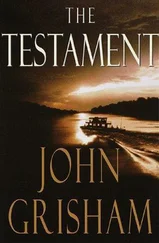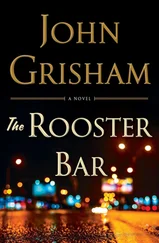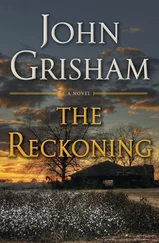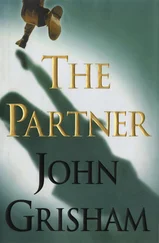Contents
Cover
Also by John Grisham
Title Page
Copyright
Dedication
Chapter 1
Chapter 2
Chapter 3
Chapter 4
Chapter 5
Chapter 6
Chapter 7
Chapter 8
Chapter 9
Chapter 10
Chapter 11
Chapter 12
Chapter 13
Chapter 14
Chapter 15
Chapter 16
Chapter 17
Chapter 18
Chapter 19
Chapter 20
Chapter 21
Chapter 22
Chapter 23
Chapter 24
Chapter 25
Chapter 26
Chapter 27
Chapter 28
Chapter 29
Chapter 30
Chapter 31
Chapter 32
Chapter 33
Chapter 34
Chapter 35
Chapter 36
Chapter 37
Chapter 38
Chapter 39
Chapter 40
Chapter 41
Chapter 42
Chapter 43
Chapter 44
Chapter 45
Chapter 46
Chapter 47
Chapter 48
Author’s Note
1
Duke Russell is not guilty of the unspeakable crimes for which he was convicted; nonetheless, he is scheduled to be executed for them in one hour and forty-four minutes. As always during these dreadful nights, the clock seems to tick faster as the final hour approaches. I’ve suffered through two of these countdowns in other states. One went full cycle and my man uttered his final words. The other was waved off in a miracle finish.
Tick away—it’s not going to happen, not tonight anyway. The folks who run Alabama may one day succeed in serving Duke his last meal before sticking a needle in his arm, but not tonight. He’s been on death row for only nine years. The average in this state is fifteen. Twenty is not unusual. There is an appeal bouncing around somewhere in the Eleventh Circuit in Atlanta, and when it lands on the desk of the right law clerk within the hour this execution will be stayed. Duke will return to the horrors of solitary confinement and live to die another day.
He’s been my client for the past four years. His team includes a mammoth firm in Chicago, which has committed thousands of pro bono hours, and an anti–death penalty group out of Birmingham that is spread pretty thin. Four years ago, when I became convinced he was innocent, I signed on as the point man. Currently I have five cases, all wrongful convictions, at least in my opinion.
I’ve watched one of my clients die. I still believe he was innocent. I just couldn’t prove it in time. One is enough.
For the third time today, I enter Alabama’s death row and stop at the metal detector blocking the front door where two frowning guards are protecting their turf. One holds a clipboard and stares at me as if he’s forgotten my name since my last visit two hours ago.
“Post, Cullen Post,” I say to the dunce. “For Duke Russell.”
He scans his clipboard as if it holds vital information, finds what he wants, and nods to a plastic basket on a short conveyor belt. In it, I place my briefcase and cell phone, same as before.
“Watch and belt?” I ask like a real smart-ass.
“No,” he grunts with an effort. I step through the detector, get cleared, and once again an innocence lawyer manages to properly enter death row without weaponry. I grab my briefcase and cell phone and follow the other guard down a sterile hallway to a wall of bars. He nods, switches click and clang, the bars slide open, and we hike down another hallway, trudging deeper into this miserable building. Around a corner, some men are waiting outside a windowless steel door. Four are in uniform, two in suits. One of the latter is the warden.
He looks gravely at me and steps over. “Got a minute?”
“Not many,” I reply. We move away from the group for a private chat. He’s not a bad guy, just doing his job, which he’s new at and thus he’s never pulled off an execution. He’s also the enemy, and whatever he wants he will not get from me.
We huddle up like pals and he whispers, “What’s it look like?”
I glance around as if to evaluate the situation and say, “Gee, I don’t know. Looks like an execution to me.”
“Come on, Post. Our lawyers are saying it’s a go.”
“Your lawyers are idiots. We’ve already had this conversation.”
“Come on, Post. What are the odds right now?”
“Fifty-fifty,” I say, lying.
This puzzles him and he’s not sure how to respond. “I’d like to see my client,” I say.
“Sure,” he says louder as if frustrated. He can’t be viewed as cooperating with me, so he storms off. The guards step back as one of them opens the door.
Inside the Death Room, Duke is lying on a cot with his eyes closed. For the festivities, the rules allow him a small color television so he can watch whatever he wants. It’s on mute with cable news giddy over wildfires out west. His countdown is not a big story on the national front.
At execution time, every death state has its own silly rituals, all designed to create as much drama as possible. Here, they allow full-contact visits with close family members in a large visitation room. At 10:00 p.m., they move the condemned man to the Death Room, which is next door to the Death Chamber where he’ll be killed. A chaplain and a lawyer are permitted to sit with him, but no one else. His last meal is served around 10:30, and he can order whatever he wants, except for alcohol.
“How you doing?” I ask as he sits up and smiles.
“Never felt better. Any news?”
“Not yet, but I’m still optimistic. We should hear something soon.”
Duke is thirty-eight and white, and before getting arrested for rape and murder his criminal record consisted of two DUIs and a bunch of speeding tickets. No violence whatsoever. He was a party boy and hell-raiser in his younger days, but after nine years in solitary he has settled down considerably. My job is to set him free, which, at the moment, seems like a crazy dream.
I take the remote and change channels to one from Birmingham, but I leave it on mute.
“You seem awfully confident,” he says.
“I can afford to. I’m not getting the needle.”
“You’re a funny man, Post.”
“Relax, Duke.”
“Relax?” He swings his feet to the floor and smiles again. He does indeed look rather relaxed, given the circumstances. He laughs and says, “Do you remember Lucky Skelton?”
“No.”
“They finally got him, about five years ago, but not before serving him three last meals. Three times he walked the gangplank before getting the shove. Sausage pizza and a cherry Coke.”
“And what did you order?”
“Steak and fries, with a six-pack of beer.”
“I wouldn’t count on the beer.”
“Are you gonna get me outta here, Post?”
“Not tonight, but I’m working on it.”
“If I get out I’m going straight to a bar and drinking cold beer until I pass out.”
“I’ll go with you. Here’s the Governor.” He appears on-screen and I hit the volume.
He’s standing in front of a bank of microphones with camera lights glaring at him. Dark suit, paisley tie, white shirt, every tinted hair gelled with precision. A walking campaign ad. Sufficiently burdened, he says, “I have thoroughly reviewed Mr. Russell’s case and discussed it at length with my investigators. I’ve also met with the family of Emily Broone, the victim of Mr. Russell’s crimes, and the family is very much opposed to the idea of clemency. After considering all aspects of this case, I have decided to allow his conviction to stand. The court order will remain in place, and the execution will go forward. The people have spoken. Clemency for Mr. Russell is therefore denied.” He announces this with as much drama as he can muster, then bows and slowly backs away from the cameras, his grand performance complete. Elvis has left the building. Three days ago, he found the time to grant me an audience for fifteen minutes, after which he discussed our “private” meeting with his favorite reporters.
Читать дальше












